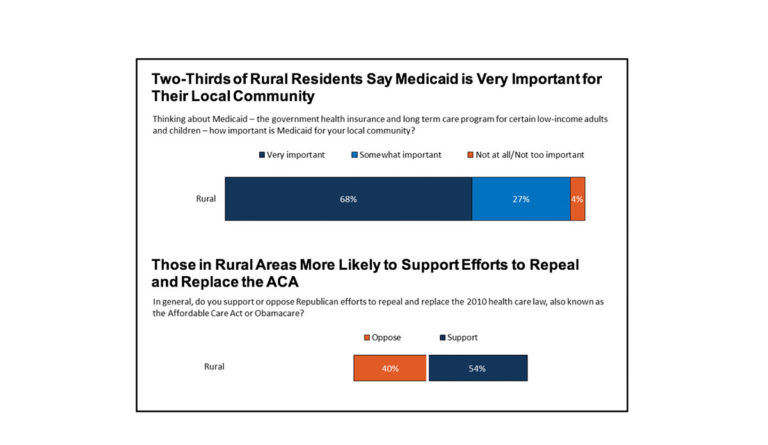A Rural Paradox: The Affordable Care Act or Medicaid?
Why do so many rural Americans who support Medicaid also support repealing the ACA?

Read Time: 3 minutes
Published:
Rural Americans generally oppose the Affordable Care Act, even though they have benefited the most from it. To better understand how American communities differ in their health care views and experiences the Washington Post partnered with the Kaiser Family Foundation to create The Survey of Rural America. Over 1000 people living in rural America were surveyed about their political views and health experiences. As reflected in the chart above, although 95% reported Medicaid as “very important” or “somewhat important” for their local community, more than half support the repeal of the Affordable Care Act.
The ACA increased access to health insurance primarily by expanding Medicaid eligibility. Without the ACA, people are at risk of losing their Medicaid eligibility. So why do so many rural Americans support Medicaid while also supporting the repeal the ACA?
“I’ve encountered this paradox in my own research,” says Dr. David K. Jones, Assistant Professor at Boston University School of Public Health. Legislators in Kansas, for instance, supported Medicaid expansion because it provided much-needed funding to local hospitals. “Medicaid financing is critical for struggling hospitals in rural areas. Hospitals would close—indeed some have—if they lose Medicaid funding.” This would harm both patients and the hospital workforce.
Medicaid brings a wide range of health care benefits into rural communities that may be otherwise be absent. Individuals in rural areas are more likely to be self-employed and enrolled in Medicaid due to limited access to employer-sponsored health insurance. Medicaid also enrolls higher percentages of children and seniors in rural versus urban areas.
A poll conducted by Morning Consult found that only 61% of adults understood that repealing the ACA would result in lost Medicaid coverage.
So if Medicaid is popular in rural America, why isn’t the ACA? Jones suggests that rural residents may be confused about how their Medicaid relates to the ACA. Some states rebrand Medicaid benefits with new names, such as Wisconsin’s “Badger Care.” While marketing Medicaid directly to state residents emphasizes its importance, it may also cause confusion regarding its connection to the ACA. A poll conducted by Morning Consult found that only 61% of adults understood that repealing the ACA would result in lost Medicaid coverage.
Other rural Americans may not like the involvement of the federal government in state-run programs. The ACA expansion is directed and funded by the federal government, but administered by individual states. A 2017 study found that a primary objective for Republican legislators involved reducing the federal government’s involvement in health policy. Jones and colleagues found that some states could better implement the ACA’s policies if introduced separately from the ACA.
It’s complicated to ascertain the underlying opinions that are reflected in ACA/Medicaid public opinion paradox. Nevertheless, the benefits rural communities gain from affordable and accessible health care are undeniable.
Databyte via Liz Hamel, Bryan Wu, and Mollyann Brodie, The Health Care Views and Experiences of Rural Americans: Findings from the Kaiser Family Foundation/Washington Post Survey of Rural America. Kaiser Family Foundation.



